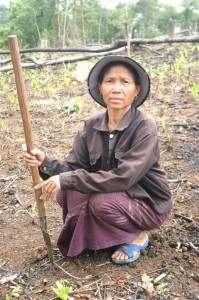Parents share facts about their son’s death in hope of saving other children’s lives.

This mother's nine-year old son was killed by a cluster bomb. Over the years we have returned to her rice field several times to destroy UXO that she and her surviving children continue to find.
Tha Lang Village - Khammouan Province - Lao Peoples Democratic Republic
Americans and other Westerners sometime rationalize the low life expectancy, high infant mortality, and staggering accidental death rate of Asians by repeating the old saw, “Life is cheap in Asia.”
What that observation implies is that we in the West value the lives of our children, our parents, our friends and neighbors more than Asian people value theirs. That the grief that we Westerners feel when touched by a death, is deeper than the emotion felt by Asians experiencing the same loss.
I recently sat down with Lao friends who lost a son in a UXO accident nearly four years ago. They struggled to tell me their tragic story. I offer the interview here in the hope that their words convey to readers that their son was a precious son and that they placed great value upon his life. As would any parent, Asian or American.
The following is an interview with the parents of Hamm, a young boy who was killed while collecting bomb fragments and other scrap in Khammouan Province.
Jim Harris conducted this interview in September 2007 while visiting the boy’s parents in their home in Thalang Village.
Mother:
It’s very difficult, but there isn’t anything I can do about it.
It happened three years ago. It was the dry season. My young son was nine years old. The other boys were classmates of his. They all went to school together.
The boys saw the older people collecting scrap. They wanted money so they wanted to collect scrap like the adults.
My son asked if he could collect scrap but I told him no. It was the first and only time that he collected scrap that he was killed.
After school was finished for the day the boys went looking. There were no other children, only adults collecting. No one encouraged the boys to go, they just tagged along behind the adults.
Father:
This is how it was:
My youngest son died from the bomb. The adults had metal detectors. They used the detectors to search for scrap; when they found metal they sold it for money.
If the adults found bombs, they set them aside. The little boys didn’t know the left behind pieces were bombs. They went to get them to collect for money.
The boys struck the bombs together.
When the bombs exploded, my son didn’t die immediately, but his guts were coming out from an open wound in his side. The other two boys were the ones who struck the bombs together. My son was standing back and just watching. The other two boys died first.
Mother:
The other boys were going to put the bombs in their bag.
Father:
My son wasn’t killed instantly. The blast lifted one of the boys and threw him through the air!
Mother:
The children didn’t know they were bombs. They didn’t try intentionally to open them.
The villagers who were herding buffalo heard the explosion and came to get us. They told us, “Your son and the other boys are hurt.”
Mother:
We hired a car to take our son to the hospital in Nakai. When we got there, they had no oxygen; no blood.
Father:
When we got to my son he said, “Father, take me to the hospital. Hurry, so I don’t die!”
If the hospital had had oxygen and blood my son would not have died. His intestines were bulging out of his side but his organs were not torn. Everything was still in good condition.
From Nakai, we went to the hospital in Yammolate, but it was the same story: no blood, no oxygen. They told us to go to the hospital in Tha Khaek, but it was too far away. On the way there my son was growing paler. His life was slipping away. Part way down the mountain we decided to go home. The hospitals had nothing.
Mother:
The driver didn’t want him to die in his car.
When we got home, our son was very thirsty and asked for water. I said, “No.” Then, he died.
Father:
I said to her, “He wanted water. You should have given him water.”
Interviewer:
Can we use your story to inform others, and help others learn?
Father:
Yes. The ones who have died have passed away, but the ones who still live should learn from this.
Father:
After the accident, I was angry. My son died because of the scrap collecting. I went throughout the village and collected eleven metal detectors from the people who had them, and I sent them to the district officials. If people with detectors refused I told them they could go to jail. If they wouldn’t give them to me I would see them in jail! After I collected them I took them to the officials.
If they hadn’t cooperated with me I would have asked the police to arrest them.
The detectors were from Vietnam. There were some who hid their detectors. I told them, “If you hide them I will have the police arrest you guys!”
